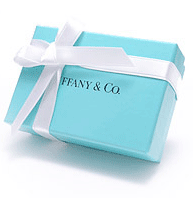Articles and News
What the Tiffany v. eBay Ruling Means to Luxury Jewelers | December 28, 2010 (5 comments)

The Centurion is pleased to announce the debut of Peter and Jonathan Berger as legal columnists. Their law firm, Levisohn Berger LLP, has been actively involved in the jewelry industry for almost 40 years, specializing in intellectual property (copyright, trademark, and patent law) as well as other legal issues. The authors have developed a special appreciation for how members of the industry integrate legal issues in their business activities. The New York-based firm may be reached at (212) 486-7272.
New York, NY—Two of the biggest threats to luxury brands and luxury retailers alike are gray market goods and counterfeit goods. While these are two separate issues, today’s online marketplaces exacerbate the trouble both cause for luxury manufacturers and retailers.
Branding is tremendously expensive but, when successful, hugely profitable. As consumer desire for the branded item grows, counterfeiting of those products grows accordingly. At best, it is detrimental to those who make and sell the genuine article, if not even potentially harmful to consumers who buy an unregulated imitation. But in recent years it also has been alleged that counterfeit profits may help fund terrorist activities.
But what does it really mean for luxury jewelers and manufacturers?
Let’s examine the United States Supreme Court’s recent refusal to consider the appeal between Tiffany and eBay. The original subject of the lawsuit—counterfeit Tiffany products being sold on eBay and Tiffany suing eBay to stop the sales—is one with which jewelers are undoubtedly familiar. In essence, Tiffany was seeking almost a complete eradication of Tiffany goods from the eBay website.

Throughout this matter, eBay’s general response was:
- that it is merely an electronic marketplace,
- that it takes reasonable steps to stop counterfeiting when aware of them, and
- that the use of Tiffany on an electronic marketplace is lawful because it is a “normative fair use” of the Tiffany name when selling Tiffany goods.
The litigation was instituted in the Federal Court in New York City, which has great experience with these types of cases. It was a “bench” trial, meaning that both parties agreed a judge would be the trier of fact rather than a jury. A jury normally returns a verdict without any explanation, whereas in a bench trial the judge normally writes an opinion.
In this case, the District Court Judge’s 66-page opinion was very informative on how legal decisions are reached and provided many background facts not generally known, and can be read in its entirety here. It was largely approved on appeal, and the Supreme Court declined to review the case.
There were certain guidelines that both Tiffany and eBay agreed applied. A party who knowingly allows counterfeit activities and/or is willfully blind to their being conducted in the party’s premises or in a party’s marketplace within its control can be held liable for counterfeiting, even if that party is not directly selling or dealing in the goods.
Cases have been decided against flea market operators with specific knowledge of counterfeiting in booths [at the market], but allow such activities to continue. Similarly, a landlord in New York City was held liable for activities of a tenant in Chinatown who was sued by Ralph Lauren because the landlord had specific knowledge that counterfeiting was occurring, yet allowed it to continue.
But brand owners like Tiffany are aware that courts do not penalize third parties who merely provide a venue for counterfeiting but do not actively participate in or have specific knowledge of the counterfeiting. This is especially true because the venue operator never owns, controls, or sells the counterfeit goods.
The court summarized that Tiffany acknowledged that individual sellers, rather than eBay, are responsible for listing and selling counterfeit Tiffany items. Nevertheless, Tiffany argued that eBay was on notice that a problem existed and that eBay had the obligation to investigate and control the illegal activities of those sellers. Tiffany specifically asked that sellers who post more than five Tiffany items be immediately suspended because of Tiffany’s belief that such sellers almost always are dealing in counterfeit goods.
The court ultimately found that eBay takes effective action against counterfeiters. Of its 16,000 employees, 2,000 work full time on issues of infringement and 70 work full time with law enforcement seeking criminal action against counterfeiters. EBay also has an automatic take-down system in place where, upon notice, it removes those selling counterfeit goods from its website and will not put them back again. The court found that of 284,149 counterfeit sellers, only 23 ever appeared again on eBay’s website. Among those, there seemed to be reasonable explanations, and according to the court, eBay’s procedure in removing counterfeiters is very effective.
On the other hand, from the evidence presented at the trial, the court found that Tiffany only had the equivalent of 1.5 persons full time per month monitoring counterfeiting activities on eBay. The court found that Tiffany could have invested more resources to monitor the eBay website, but did not.
While there was some dispute as to what percentage of Tiffany items on eBay’s website actually was counterfeit, the court was willing to find that a “significant” amount of Tiffany items on eBay were counterfeit. Tiffany did some purchasing of items to establish a percentage, but the court found that the evidence was not strong enough to support its position that three-fourths of the Tiffany items on eBay were counterfeit.
Courts in other countries have reached different decisions on this issue. Most notably, France appears to be the most aggressive in enforcing trademark rights against third parties. The luxury brand business is an important aspect of the French economy, and the courts there appear to be far more protective of brands than elsewhere. In France, eBay was ordered to pay LVMH US $61 million in damages for having counterfeit items on its site, and Hermes was successful in stopping eBay sales of counterfeit versions of its “Birkin” bag. On the other hand, a German court refused to hold eBay liable in a counterfeiting lawsuit involving Rolex watches.
What does the Tiffany vs. eBay decision teach luxury jewelers and brands seeking to stop Internet sales of counterfeit goods? The clearest line of success is to show that the accused was willfully blind or had actual knowledge but took no action to stop counterfeit activities within the environment controlled by the defendant.
In fact, in a recent decision heartening to brands, a Federal District Court in New York refused to dismiss a lawsuit against a credit- processing agency which was sued by a brand owner, claiming that the agency had actual knowledge of its customers’ online counterfeiting activities. The court found that processing payments could constitute contributory infringement and, therefore, the credit card processor could be liable. At presstime, however, that case has not been finally decided because all the evidence was not yet presented.
A final note, however, is that Congress has the power to rewrite laws to allow eBay to be held liable for damages for counterfeiting where the counterfeit goods are merely sold on the website. There is ongoing pressure from brand owners for Congress to rewrite the laws to provide greater brand protection.







